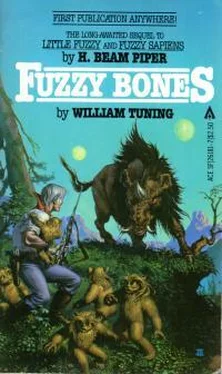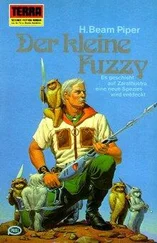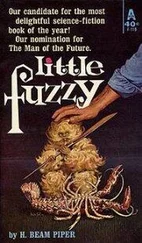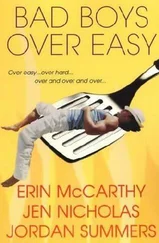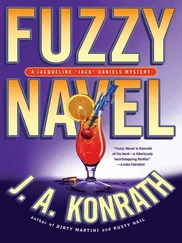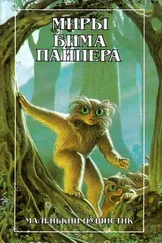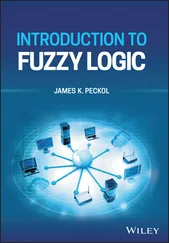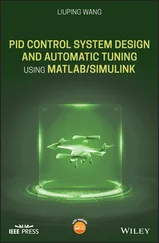Laporte's voice dropped about three tones. "I don't know what it is. It looks to be just what my people say has leaked out about it-the buried wreck of some kind of spaceship. It's been there a long time. So far, no word about any sunstones."
Ingermann laughed, shrilly and high-pitched. There was a rather odd look on his face that Laporte did not like at all. He decided it was time to start cleaning his fingernails.
"All that digging?" Ingermann said. "All those people? Coded messages flying back and forth, like featherleaf pods in a high wind? And all you can tell me is that crackbrained rumor about a buried spaceship?" He laughed again. "I thought you had better sense, Raul."
Laporte shurugged and went on cleaning his fingernails with a huge clasp knife.
"These idiots in the Colonial Government," Ingermann chuckled. ' "The richest deposit of sunstones yet is practically within spitting distance of this spot." He pounded a pudgy finger on one of the infraslides. "And all they can come up with is a cover story about a-a spaceship wreck!" He spat out the words.
"I came for the other thousand sols you owe me," Laporte said in a very quiet voice.
Ingermann wiped tears of mirth from his eyes. "Oh, Raul, you're going to have to do better than this before that thousand ever sees daylight."
"The deal was 'definite information,' " Laporte said. You have your definite information. Now, I'll have my money."
"Not until you find the sunstone strike, you won't!" Ingermann leaned forward suddenly, slapping the palms of both hands flat on the desk.
In the absolute silence that followed, Laporte raised his head from the preoccupation with fingernails and looked Ingermann in the face.
When he sprang from the chair, he landed on his knees, on top of the desk, with a knee on each of Ingermann's hands. Printout stacks and infraslides cascaded off onto the floor. With a snatching motion of his left hand, he grabbed Ingermann by the neckcloth, pulling him a little closer.
Slowly, Laporte placed the point of the knife against Ingermann's left carotid artery, just below the jawbone. Ingermann's round, pink cheeks turned chalky white. "The money," Laporte said.
Ingermann inclined his eyes to indicate the appropriate desk drawer.
Laporte lifted his left knee. "You get it," he said. Ingermann opened the drawer with the released hand, opened the wallet, and shook out the sheaf of currency.
When Laporte was again standing on the floor and some of the color was returning to Ingermann's face, Laporte said, "I don't think you have the
nerve, sir, to try anything what wouldn't be smart. Y'see, there's one of my men out in the hall with a submachine gun. If I don't come out of here with a smile on my face, his orders is to come in here and turn you into dog meat."
Ingermann cleared his throat and adjusted his neckcloth. "I understand," he said.
Laporte nodded. "Good. I hope this don't have any bad effect on our business dealings in the future, Mr. Ingermann, but we are gonna have to be more specific about what the deal is."
Outside Ingermann's office, Laporte closed the door quietly, put away his knife, and walked off down the empty corridor.
Chapter 23
An austere but rather shaggy gentleman of middle years peered out of the screen. "Surely you jest, Governor," he said. "Why, we've been a fixture in Mallory sport-to say nothing of bringing a tiny scrap of culture to the rest of the planet-for almost ten years, now. You are going to dissolve it; just like that? Preposterous!"
Ben Rainsford glowered into the pickup at his end of the conversation. "I didn't say I was going to dissolve it, Mr. Wachinski. I said there's no money for it."
Holger Wachinski was the director of the Mallorysport Civic Opera Association, an annoying-to Ben Rainsford- leftover from Nick Emmert's administration as Resident General, before the CZC charter had been revoked. He was quite naturally in high dudgeon to discover that his budget had been chopped off.
"I must say, that's pretty mundane of you, Governor. As bread feeds the body, art feeds the soul, even if you-" Wachinski stopped, realizing he was not helping his case.
Rainsford chuffed on his pipe. "It don't make a damn whether I like opera or not, Mr. Wachinski. I'm in a position of having to make bricks without straw, here. If it comes down to a choice between opera and having citizens robbed on the esplanade, I have to can the opera and hire more cops-except I've not got enough money for that, either."
"You realize," Wachinski said, with what he hoped was an oracular tone, "that you're just contributing to the unemployment problem?"
Better yours than mine, Rainsford thought, but he decided not to say it. He rubbed his eyes. "Look, Wachinski; how much of your budget do you raise by private subscription?"
Wachinski looked at the ceiling for a moment. "About half-enough to cover the opera company. But that's useless without the symphony."
"I'll tell you what I'll do, Wachinski," Rainsford said. "You get off your butt and raise enough more to pay for half the symphony, and the Colonial Government will match-fund you on that part for the rest of the season. If the opera company caves in, you'll still have the orchestra. Deal?"
Deal, Wachinski thought, a decree. "Under the circumstances," he said, "we'll try to make do."
The Navy cruiser, at that altitude, looked about the size of a pool-ball fruit
from the ground when it began to turn out its cargo of men and vehicles.
There is a certain precision and grace in the sight of a line battalion turning out of a ship. It is as much of an aerial ballet as a convoy movement from ship to ground. An enormous quantity of vehicles are involved for several hundred men-or so it seems. All of these particular vehicles were of a squatty, ungainly appearance, built to withstand incredible punishment and still operate. The center was an almost solid skirt of service equipment for ordnance, maintenance, vehicle recovery, field kitchens, supply boats, communication centers, and operations centers. Ranged around these were squad buses in neat platoon lines, with the four companies positioned port, starboard, aloft, and below. Casagra's men were already on the ground, sweating and cursing with the dig. Spiraling gracefully away from the main body, the scout cars skimmed and darted like airborne sheepdogs.
Holloway and his group were still at the site; in fact had been waiting for the battalion to arrive. There were a few things Holloway wanted to get clearly understood with the battalion commander before he went back to Holloway Station, and George Lunt had a few points he wanted to pick over, as well. Rainsford had departed well before dawn, ranting and raving about the exigencies of being Governor General.
As the battalion vehicles encamped, the commander's car grounded about a hundred meters from the waiting group of officials.
Lieutenant Colonel James O 'Bannon and his exec., Major Richard Stag well, dismounted and crunched across the dry soil of Fuzzy Valley toward them.
Ordinarily, it would have been the other way around, but officials of the civil government were in the waiting party, so deference was being observed.
Introductions were exchanged all around, which took an inordinate amount of time, since ten people were involved.
Holloway looked over O'Bannon and Stagwell, figuring out the best way to handle them.
O 'Bannon was a little shorter than average, and was one of those men who could spend three weeks in the field and never put a wrinkle in his impeccable field greens. He had a handsome, almost boyish face, contradicted by the tinge of gray in the regimental beard and mustache which framed his jaw. His eyes were slightly hooded, like a cobra's, of an indeterminate color, and never betrayed expression, even though he smiled obligingly from time to time.
Читать дальше
